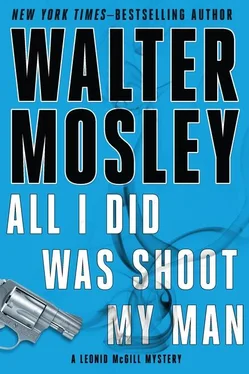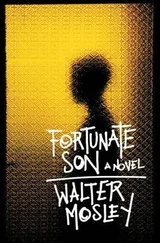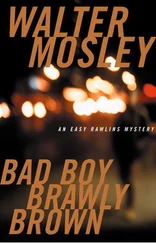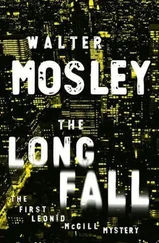“Where?”
“We’re kind of like an informal international insurance company.”
“I don’t need any insurance, Mr. Plimpton. Sorry.”
“We don’t sell insurance, ma’am. We take in money under short-term conditions to protect the interests of people not covered by international law.”
“What does that have to do with me?”
“Ten thousand dollars,” I said.
“I don’t understand.”
“We’re running an internal investigation and are willing to pay ten thousand dollars for information leading us to the whereabouts of Mr. Harry Tangelo.”
At that point the woman admitting to be Teresa Lesser hung up.
It was very comfortable there in the twilight, on that bench. So much so that it took me a moment to realize that the fever, once again, had caught up to me. I downed the last two aspirin that Twill had given me and made a call.
“Hello?” he said.
“Johnny?”
“LT. How you doing?”
“Good. You?”
“All healed up.”
On our last collaboration Johnny Nightly made a slip and got himself shot in the chest by a very accomplished killer. The assassin died and Johnny didn’t — that’s the most one could have hoped for.
“Luke there?” I asked.
A moment passed, and then, “Hey, Leonid. What’s up?”
“I got some issues.”
“With me?”
“A thing or two you could help me with.”
“Shoot.”
“I’m looking for an address and I need you to put up a woman for a week or so. You got any empty rooms upstairs?”
“No problem with the room.”
“She should probably stay out of sight and maybe Johnny could look in on her now and then.”
“That’s easy.”
Luke Nye was many things. He’d killed men, dealt in women, even pulled a heist or two in his time. He’d been a regular jack-of-all-trades until deciding on pool as his major and dealing in information as his minor in the ongoing adult education University of Life.
“And then there’s Stumpy Brown,” I said.
“What about old Stumpy?”
“You got numbers on him?”
“Five hundred a night for the room and a thousand for Stumpy,” he said.
“Hello?” she said on the house phone in the downstairs hall of Mary Deharain’s rooming house.
“It’s Leonid, Zella.”
“Oh... What do you want?”
“There’s a guy named Iran Shelfly lives there. He’s in room three-oh-six.”
“I’ve met him.”
“He’s a friend of mine. I sent him a text, telling him to drive you out to another friend’s in the Bronx. I think you’ll be safer there until I figure out this thing with Rutgers.”
“What are you up to?” she asked.
“I’m trying to help.”
“Why?”
“Because Breland is paying and I need the work.”
“I didn’t have anything to do with that heist. There’s no money you can get out of me.”
“I know that, Zella.”
It was the closest I would ever come to a confession. It wasn’t enough to bring me to justice but I think she heard it; I could tell by her silence. After that I explained what was going to happen to keep her safe. She didn’t argue.
“Yeah?” he said.
That particular phone never rang — a fact that had something to do with the security system associated with it. No one could eavesdrop on or trace any call to that number.
“Hush?”
“What’s up, LT?”
“Are you working?”
Hush, since retiring from the assassination business, had been employed as a limousine driver. Don’t ask me why. He had more money than Gordo.
“Didn’t I tell you?” Hush said.
“Tell me what?”
“I bought the company. All twenty-seven cars now drive for me. I just keep my regulars and get to spend more time with Thackery and Tamara.”
It was hard to imagine Hush as a family man even though I had been a guest at his house half a dozen times. It seemed both illogical and unfair.
“You want to come get me and take a ride out to the beach?” I asked.
“Okay.”
“Hello?” Katrina said.
“Hey, babe,” I said, nearly biting my tongue for saying the same thing to both Katrina and Aura.
“Leonid.” There was relief in her voice. “Where are you?”
I was only four blocks away but I said, “In Brooklyn. I’m deposing a witness for Breland.”
“Is it safe?”
“Yes... very.”
“I’ll wait up for you.”
Seventeen minutes later Hush drove up in a black Lincoln Town Car. I hopped in next to him. He was wearing dark but not black clothes; chocolate brown jeans and a dusk-colored T-shirt. His dark blue sailor’s shoes were made from heavy canvas. His brown hair worked as its own camouflage.
I hadn’t told him that we were on serious business — he just knew.
Going down the West Side Highway, I explained about Zella and the complications that had arisen. He listened and nodded and drove.
We went through the tunnel at the bottom of Manhattan and made our way to the Gowanus Expressway, headed south.
“Why don’t you just leave well enough alone?” he asked when approaching the Belt Parkway.
“You mean leave Zella to rot in jail for something she didn’t do?”
“She shot her man.”
“They wouldn’t have been so harsh for that alone. I mean, she’d gone crazy.”
“It’s crazy to get her out of prison.”
“Yeah, but...”
“But what?”
“I don’t know. When I’m in bed early in the morning I wake up sometimes and think about the people I’ve wronged. Some of them, most of them, were pretty bad to begin with. I can live with that. But people like Zella... I mean, what good is life if you can’t stand up?”
“That’s what boxers do, right?”
“What?”
“They get knocked down and stand up again.”
“Yeah. If you’ve never been knocked down, then you’ve never been in a fight.”
The sun was gone when Hush parked on a side street five blocks from the address Luke Nye gave me. It was a square, flat-roofed pink stucco house not far from the ocean in a run-down but quiet part of Coney Island.
The doorway was inside a vestibule, so when no one answered our knock I used my tools to pick the lock and go in — we had already donned thin cotton gloves.
The first thing Hush did when we entered was to sniff the stale air.
“Huh,” he said.
It was a small, impersonal home. The living room had a couch, standing on short wooden legs, and a tan carpet made from cheap synthetic fiber. It could have been a motel room at the Jersey Shore — in 1957.
The bedroom had an unmade queen-sized bed, a dresser with three drawers, and a maple chair. There were various pants and shirts, shoes and socks strewn on the floor. Dust devils conferred in the corners, and I saw three small roaches rubbing antennae on the barred windowsill.
The kitchen sink was filled with dirty dishes in gray water. The roaches met in greater numbers there.
“Look,” Hush said.
At the end of the kitchen counter was a door with two or three plastic garbage bags stuffed into the crack at bottom.
“That’s where the smell is coming from,” Hush added.
“What smell?”
Instead of answering, the retired professional killer handed me a blue handkerchief he took from his back pocket. He had a yellow one for his mouth and nose.
When he yanked the door open it seemed as if the room was flooded with poison gas.
The roaches froze for a moment and then headed for the smell.
We did too.
Between the washer and dryer, tied to a kitchen chair, sat Durleth “Stumpy” Brown. His once pink skin was now gray and his flabby face had hardened into a mask. My eyes stung from the gases his body released.
Читать дальше












